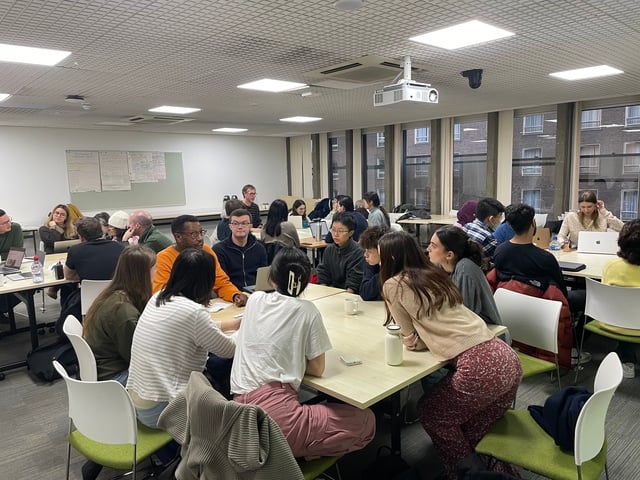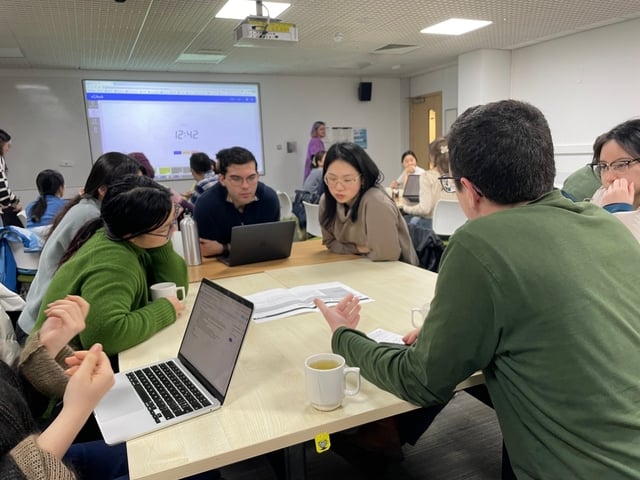In the most recent Student Sustainability Forum, students had the opportunity to meet UCL's senior sustainability management and weigh in on key priorities of the new UCL Sustainability Plan.
Did you know that UCL has more that 50,000 students and 16,000 staff, and occupies more than 200 buildings? It is also one of the leading research and education institutions in the country and the world, with huge influence potential locally and globally. With the size of a small town and global reputation for excellence, the university has a responsibility to respond to the climate crisis with due urgency and ambition.
The Student Sustainability Forum on 25 January provided a platform for all UCL students to feedback on the university's new Sustainability Plan. The event was once again hosted by Mary McHarg, the President of the Students' Union, who was the facilitator and led on gathering student feedback. Recently, Mary attended COP28 in Dubai and took student feedback with her - see Mary's climate action updates and find out how you can be a Climate Leader here.

For this Forum, we were joined by key UCL staff as speakers and discussion facilitators:
- Jason Clarke, Assistant Director, Sustainable UCL
- Hannah Biggs, Senior Sustainability Manager, Sustainable UCL
- Evan Landy, Sustainability Manager, Sustainable UCL
- Simon Knowles, Head of Coordination (Sustainable Development Goals), UCL SDGs Initiative
To set the scene for discussions, Jason gave a presentation on the background and development of the new UCL Sustainability Plan. Students had an opportunity to hear the latest updates directly from staff and then share their views on the following themes:
- Carbon & Energy (led by Jason)
- Education & Research (led by Simon)
- Responsible Consumption (led by Evan)
- Biodiversity (led by Hannah)
Carbon & energy
- Net-zero 2030 commitment - students happy with it, but how it will be achieved should be articulated.
- Scope 3 emissions - should be included in the net-zero commitment.
- Carbon offsets - decarbonisation should be prioritised over offsetting, full transparency on the reasons behind potentially missing targets and any actions to close the gap.
- Carbon literacy - training for students a good idea, but tailored to degrees and career paths; engagement should be measured.
- Internationalisation - general agreement travel emissions should be included in UCL footprint: start- and end-of-term travel is UCL responsibility as it's part of the business model. Solutions: online courses, reduce number of international students, mention emissions impact to students before enrolment (but careful not to limit opportunities).
- Offset of travel emissions - general feeling that institutions should take responsibility to offset, not students. Information on travel footprints should be known and available. Offsets available and encouraged on a voluntary basis.
Education & research
- What is sustainable education for you - Contextualised within the subject area; interdisciplinary across ecosystems, climate justice, shared values; linked to action and case-study based.
- Skills and knowledge related to sustainability - interdisciplinary training related to sustainability: ability to reflect on the social implications of environmental issues; combining awareness of climate science and climate justice issues with everyday actions to live a sustainable life.
- Which students should receive ESD - every student should receive ESD: undergraduate and postgraduate, all courses.
- How would you want to learn sustainability knowledge - there should be a credit-bearing sustainability module as part of every degree as well as other extracurricular opportunities.
Responsible consumption
- UCL should implement a universal system for sharing resources.
- UCL should increase plant-based options in a healthy and inclusive way.
- UCL should aim to reduce the use of single-use cups in UCL cafes.
Biodiversity
- Biodiversity on a local level (on campus) - expanding and maintaining biodiverse space on campus, biophilic design, engagement with biodiversity through integrating nature into education.
- Biodiversity on a global level - increasing the university’s global impact on biodiversity via partnerships with charities, companies etc that have the common aim of increasing biodiversity; sourcing food and other products from more ethical and sustainable sources.
- Setting targets for biodiversity - importance to focus on biodiversity compared to other areas of sustainability e.g. carbon footprint, measuring and budgeting for biodiversity goals to ensure they are viable and achievable.
The key takeaways from the student feedback will be incorporated into the development of the new UCL Sustainability Plan through the UCL Sustainability Plan Steering Group as well as its themed subgroups.
The complete discussion notes can be found below - big thanks to all Student Sustainability Ambassadors who helped capture all the discussion points:
Get involved!
The Union is working on a new sustainability induction training aimed at all UCL students. We need your voice to help shape it - come along to the next Student Sustainability Forum to share your feedback and meet staff working on the project.

